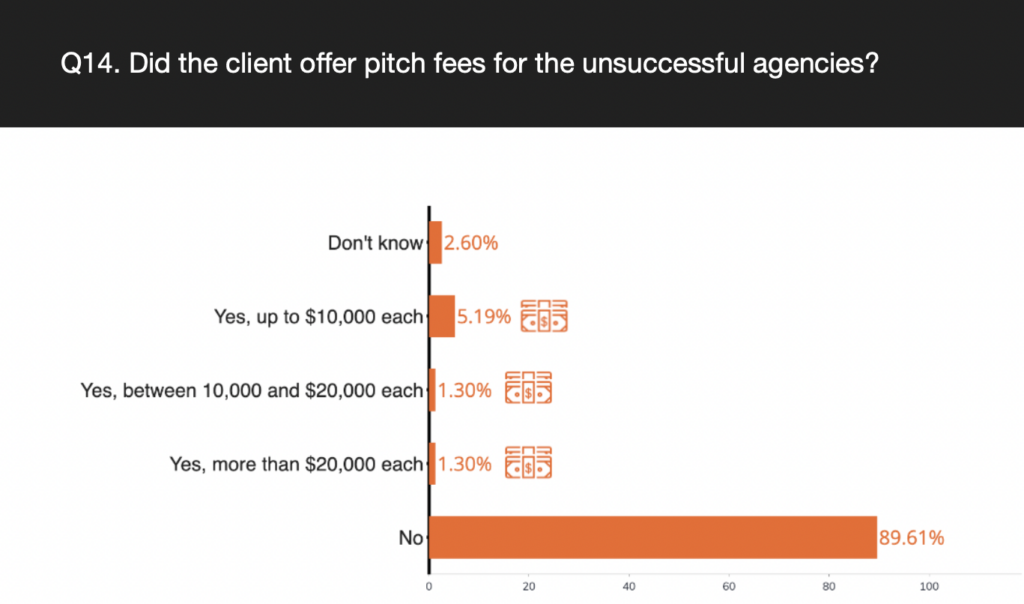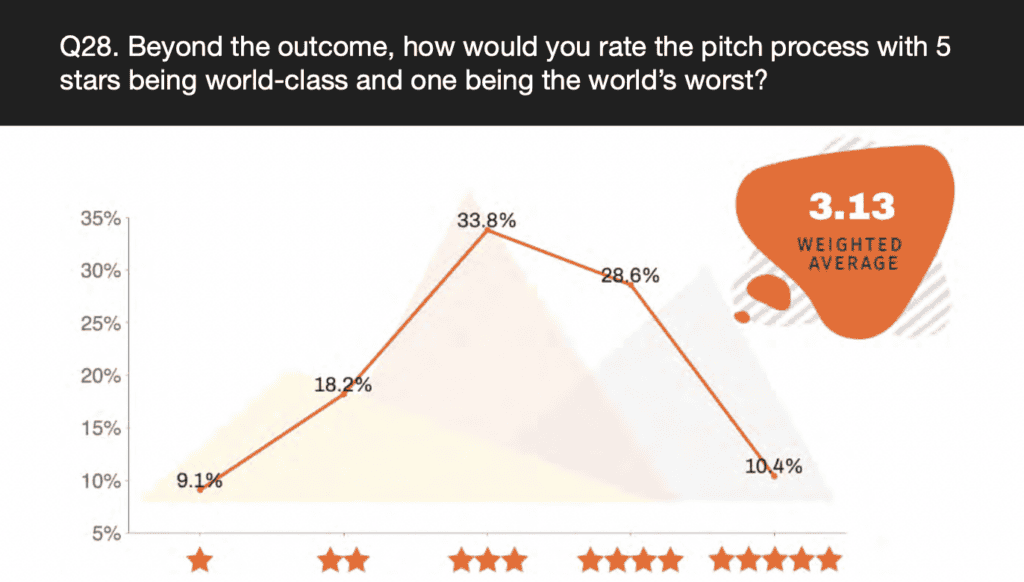89% of agencies unsuccessful in pitches were not paid a fee by the client, according to an inaugural piece of TrinityP3 research, which also documents “examples of clients, marketers, and procurement primarily treating agencies abysmally.”
In its first-ever ‘State of the Pitch‘ report, the marketing management consultancy reported that 5% of agencies were paid up to $10,000 each, only 1% were paid between $10,000 and $20,000, while another 1% were paid more than $20,000.
Darren Woolley, founder and CEO of TrinityP3 Marketing Management Consultancy, told Mediaweek that few marketers were paying pitch fees, and if they were, it was a small amount.
“If you’re asking an agency to develop a full campaign, the out-of-pocket and head-hour costs could be between $50,000 to $150,000, so paying $5,000 or $10,000 can be tokenistic.”
A similar sentiment was shared by an agency respondent, who said when responding to the survey: “The ask to respond to a creative brief means we spent $150,000 in time on this pitch. A lot!”
Another key issue raised in the report was the sheer sizes of pitch lists. One agency respondent noted that 45 agencies were involved in a pitch.
Woolley said: “Some people think it’s a good thing to do because you’re making sure you’re covering the whole industry. But it’s an incredibly time-consuming and a possibly wasteful approach to getting to your shortlist.”
An agency respondent shared a similar sentiment: “Put an online submission in. Never heard a thing from them. Read about appointed agency in trade press eight months later.”
Woolley said of that example: “The report includes examples of clients, marketers, and procurement primarily treating agencies abysmally. One agency was asked to fill in a big RFP; they sent it off but couldn’t get the client to respond. The agency found out it had gone to another agency when they read about it in a press release.”
The report noted that agencies participating in open tenders accounted for 1 in 10 pitches surveyed. “Open tenders are a waste of time,” according to one agency.
‘No one is asking questions about the process’: A proactive pitch approach
The State of the Pitch report aims to take a proactive approach to the pitch process and examine what could be improved.
Over six months, 77 pitches from across Australia and New Zealand, covering 28 industry categories were subject to the survey.
Woolley said that the marketplace is buzzing with reactive discussions and opinions that were “generally negative” about the pitch process.
“But no one is asking questions about the pitch process itself, what’s working and what isn’t working for the agencies.
“That’s why we launched it [the report]. There’s no point in having a conversation about this unless we’ve got some data to actually show what’s going on.”
Issues agencies faced also included no clear objective or direction, no clear communication with the marketer and/or procurement team, and a lack of adherence to the duration of pitches.
TrinityP3’s State of the Pitch report asked agencies to score the process, with one being the worst and five being the best. The average was 3.13 out of 5.
Woolley said that while there were a few fives and ones throughout the survey responses, the overall score was “not great.” He noted that the process “could be a lot better” and that there was also “a big room for improvement here.”
Lydia Feely, general manager of TrinityP3, added that the report showed a significant difference in how agencies scored the process depending on whether marketing, procurement, or an external consultant was running the pitch.
“Sadly, in too many cases, agencies were reporting a lack of ‘table stakes’, the minimum requirements that make sure the client pitching business has a clear and reasonable process that they know they can stick to and which will keep everyone involved informed and respected.”
‘Respectful and rigorous’: Industry takeaways
Woolley said he hopes that with TrinityP3’s insights and data, the industry will have informed and constructive discussions about pitching and explore innovating how pitches are run, and agencies selected.
“By giving people some numbers, I’m hoping this will start a more informed discussion around what we need to do. Saying things like ‘ditch the pitch’ [Mat Baxter‘s infamous catchcry from 2019] is not very helpful because clients will still have to find ways of selecting agencies.
“Whether a client comes to us with a very small project or is spending millions of dollars, we can advise them on how to do it in a way that is respectful and rigorous but not onerous on the participating agencies.”
Woolley is also hoping marketers and procurement teams focus on treating agencies with respect when they take part in pitches. A bad pitch causes “angst and hatred that that agency will go around telling everyone how the pitch process is broken.”
“We need marketers, procurement teams, and consultants to make sure they treat agencies with professional respect and dignity and not treat them like just some commodity supplier to be rough-housed and beaten about.”
See also: Pitch process ‘same one that’s seen in Mad Men’: Darren Woolley dissects pitching’s ‘bad name’




